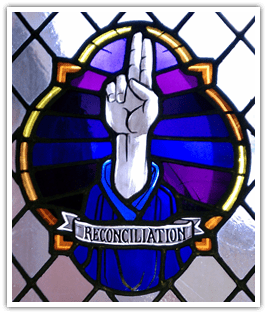
Despite our best efforts, sometimes the things we do and things we say go awry. Our own behavior falls short of own expectations, and can hurt ourselves or others. These are acts that separate us from what we know to be God’s hopes, desires and expectations for us. This separation from God’s will is what the Church refers to as sin.
The Church also recognizes that none of as humans, even as children of God, are called to be perfect. As St. Paul wondered, “What I do, I do not understand. For I do not do what I want, but I do what I hate.” (Romans 7:15)
And so, following Jesus’ model and recognizing the authority given to his disciples, the Catholic Church has established the Sacrament of Reconciliation – often known as confession. “For whose sins you forgive, they are forgiven,” Jesus said to his apostles. (John (20:22)
Through Reconciliation, Catholics individually are allowed to confess their sins to a priest, who, sitting is the person of Christ, forgives our sins by offering absolution. We believe that once forgiven, those sins are wiped away.
As we make an Act of Contrition, expressing true sorrow for our sins, and following with an Act of Penance the priest asks of us, we are reconciled with the God who loves us and with each other. Reconciliation is not about crime and punishment, but about falling short, seeking forgiveness and reconciling with God.
Catholics are encouraged to make confession frequently, and at least once a year, preferable during Lent. It also is required for those preparing for the Sacraments of First Holy Communion and Confirmation.
Our priests are available for reconciliation from 2:30 p.m. to 3:30 p.m. on Saturdays or you may call the parish office for an appointment.
